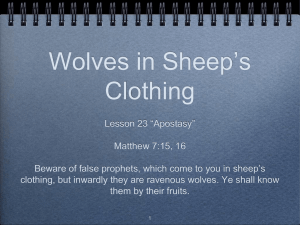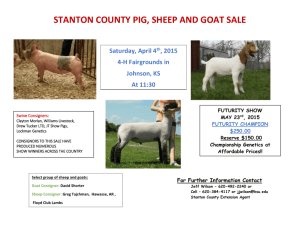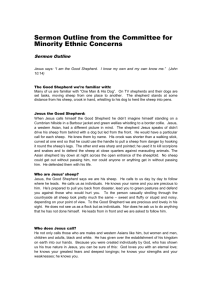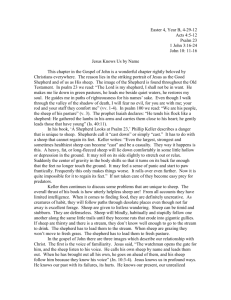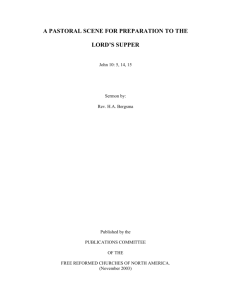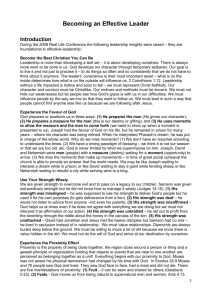Sheep to produce in God`s flock on God`s country
advertisement
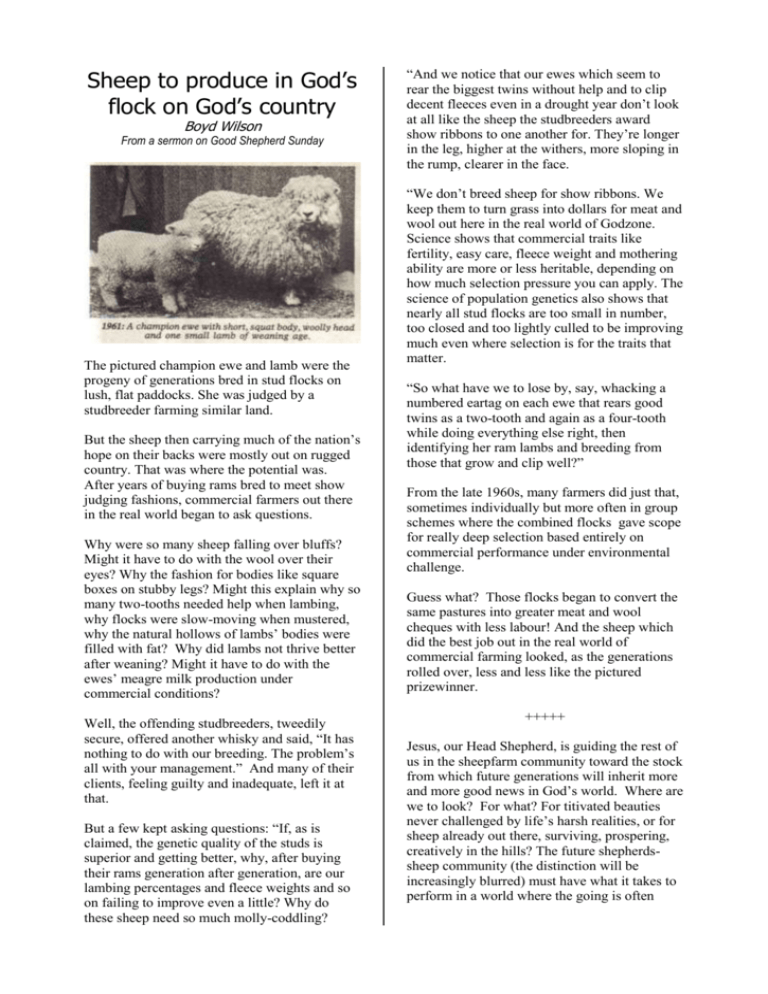
Sheep to produce in God’s flock on God’s country Boyd Wilson From a sermon on Good Shepherd Sunday The pictured champion ewe and lamb were the progeny of generations bred in stud flocks on lush, flat paddocks. She was judged by a studbreeder farming similar land. But the sheep then carrying much of the nation’s hope on their backs were mostly out on rugged country. That was where the potential was. After years of buying rams bred to meet show judging fashions, commercial farmers out there in the real world began to ask questions. Why were so many sheep falling over bluffs? Might it have to do with the wool over their eyes? Why the fashion for bodies like square boxes on stubby legs? Might this explain why so many two-tooths needed help when lambing, why flocks were slow-moving when mustered, why the natural hollows of lambs’ bodies were filled with fat? Why did lambs not thrive better after weaning? Might it have to do with the ewes’ meagre milk production under commercial conditions? Well, the offending studbreeders, tweedily secure, offered another whisky and said, “It has nothing to do with our breeding. The problem’s all with your management.” And many of their clients, feeling guilty and inadequate, left it at that. But a few kept asking questions: “If, as is claimed, the genetic quality of the studs is superior and getting better, why, after buying their rams generation after generation, are our lambing percentages and fleece weights and so on failing to improve even a little? Why do these sheep need so much molly-coddling? “And we notice that our ewes which seem to rear the biggest twins without help and to clip decent fleeces even in a drought year don’t look at all like the sheep the studbreeders award show ribbons to one another for. They’re longer in the leg, higher at the withers, more sloping in the rump, clearer in the face. “We don’t breed sheep for show ribbons. We keep them to turn grass into dollars for meat and wool out here in the real world of Godzone. Science shows that commercial traits like fertility, easy care, fleece weight and mothering ability are more or less heritable, depending on how much selection pressure you can apply. The science of population genetics also shows that nearly all stud flocks are too small in number, too closed and too lightly culled to be improving much even where selection is for the traits that matter. “So what have we to lose by, say, whacking a numbered eartag on each ewe that rears good twins as a two-tooth and again as a four-tooth while doing everything else right, then identifying her ram lambs and breeding from those that grow and clip well?” From the late 1960s, many farmers did just that, sometimes individually but more often in group schemes where the combined flocks gave scope for really deep selection based entirely on commercial performance under environmental challenge. Guess what? Those flocks began to convert the same pastures into greater meat and wool cheques with less labour! And the sheep which did the best job out in the real world of commercial farming looked, as the generations rolled over, less and less like the pictured prizewinner. +++++ Jesus, our Head Shepherd, is guiding the rest of us in the sheepfarm community toward the stock from which future generations will inherit more and more good news in God’s world. Where are we to look? For what? For titivated beauties never challenged by life’s harsh realities, or for sheep already out there, surviving, prospering, creatively in the hills? The future shepherdssheep community (the distinction will be increasingly blurred) must have what it takes to perform in a world where the going is often steep, droughts are common and the flock needs leaders who can forage far and freely. Could it be that the structured life of the Church has, in the last couple of generations, tended to be to the whole cultural environment of Central Otago what fashionable studbreeding was to the commercial sheep industry in 1961? Could it be that the reason Jesus is inviting us to go out with him on a straggler muster is not because he wants more sheep to get tamed and fat and irrelevant to the world on the lush stud paddocks of religion? Could it be that Jesus wants us to help him to recognise, affirm, free, equip and channel into his responsive service people who are not now active in our life as church – not because that will make life easier and nicer for us and them, but because he really needs them for his work in the world? Not because he spurns our gifts but because there are people out there with gifts lacking in a church that has slothed too long in the comfort of the stud paddocks? mission in the world with our self-justifying wish to get more bottoms onto our traditional pews. We will celebrate increasing diversity among God’s sheep. We will know the truth that different sheep perform best in different environments – so we will not try to insist that tussock country types should perform happily on home paddocks. We will know that variation is the stuff of inherited progress through the generations of any flock. We will know that there is no need for culling on the Good Shepherd’s farm. We will know that every one is loved and valued infinitely as a potential partner in the development plan of creation-redemption. Some of the lost sheep Jesus seeks to muster might seem a bit more weather-beaten than has been usual on our church. But these are sheep especially needed by the Good Shepherd in his work of encouraging the spread of more love from the paddocks of religion. Some are unimpressed by the answers offered by entrenched religion because they are struggling with different, valid questions. All are sheep already loved by God’s Good Shepherd as much as he loves each one of us already in touch with him. They need and deserve to know that. Jesus doesn’t corner them, catch them, tie their legs and throw them into the back of his ute in order to incorporate them in his ministering flock.. He just wanders out among them, invites them to follow, and leaves the gate open as he moves on. Those of us who understand ourselves to be already in the Jesus-flock have no cause to sleep smugly under trees. We are called and equipped to be out and about, inviting, reflecting the divine love for every person and the divine value placed on every person’s special gifts, introducing each to the Good Shepherd. We will not confuse his 2

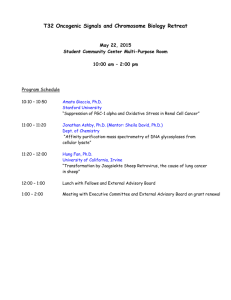

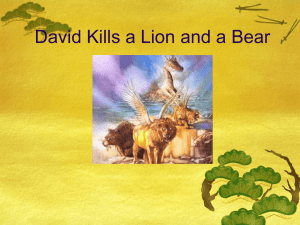
![Teeswater Sheep Breeders` Association Me[...]](http://s3.studylib.net/store/data/007144755_1-44ce9acb9fb5e8e8a9fd22b9cf356606-300x300.png)
